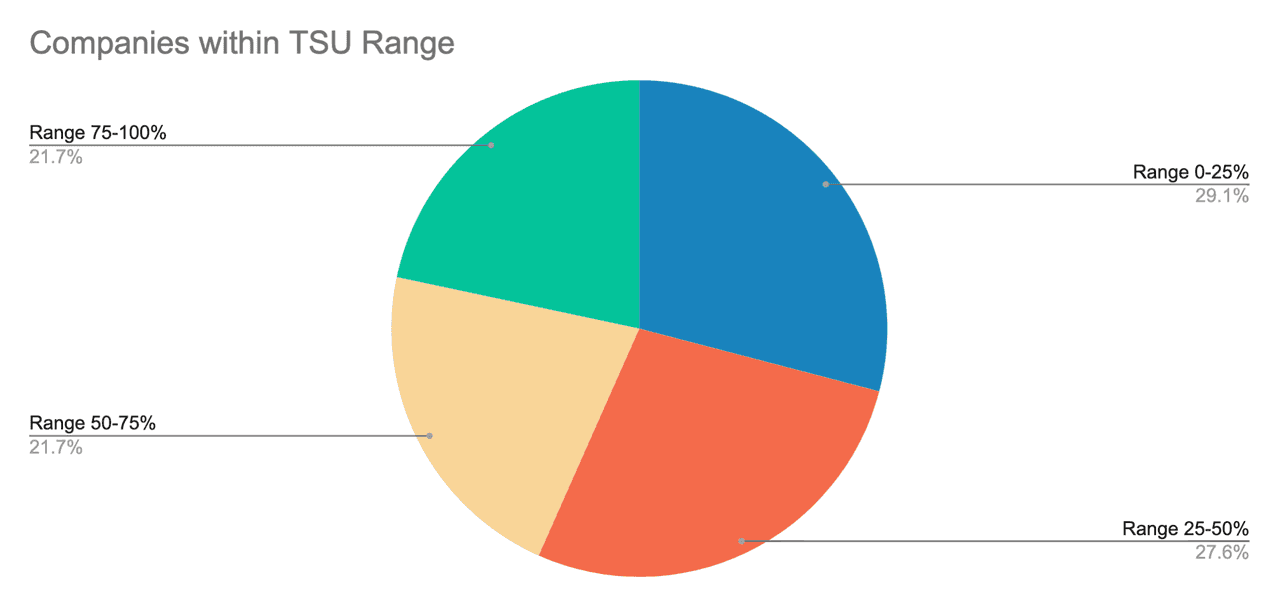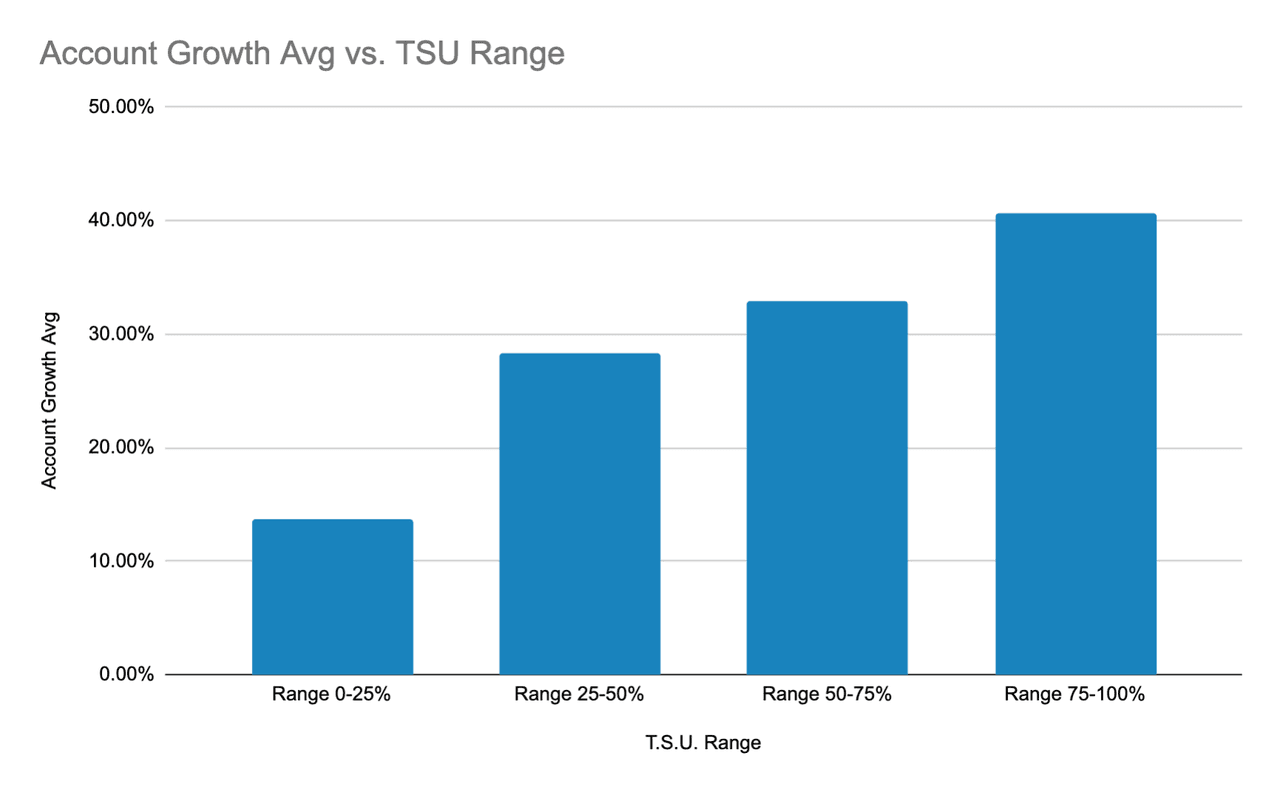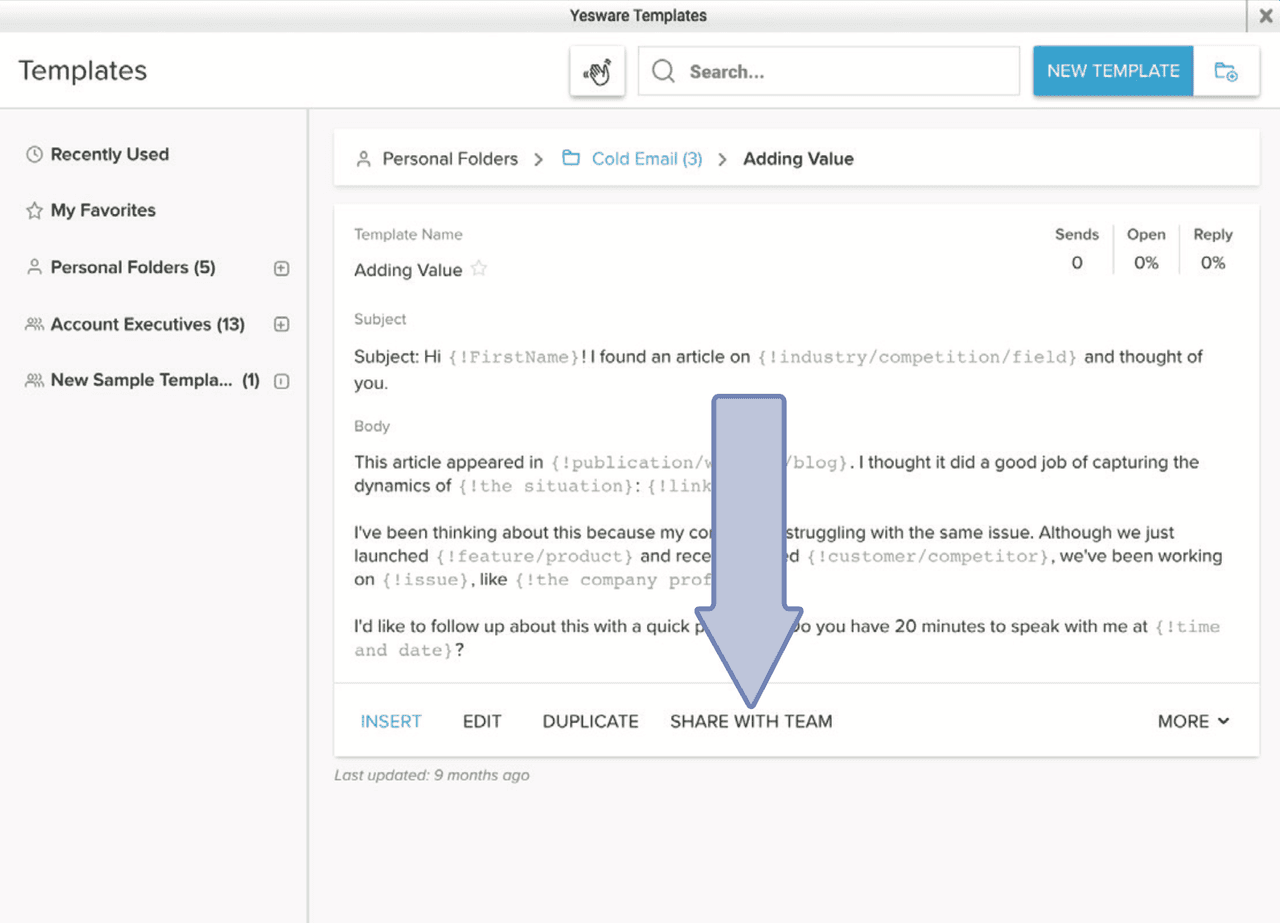Sales Team Collaboration: Data Shows Rep Collaboration Affects Team Growth
Jenny Keohane
What if we told you companies that adopt sales team collaboration grow 2.5x more than companies that don’t? Well, this is a fact backed by 170 million data points.
Sales team collaboration has never been more important. And sales reps who aren’t embedding this strategy into their daily workflow are leaving time and money on the table.
We studied 203 companies that actively use campaigns and templates to uncover if sharing this content and team growth are positively correlated.
Our findings show the shocking truth of sales team collaboration – there is an evident positive correlation between best practice sharing and account growth. Let’s look at the data and uncover how you can achieve account growth today.
Sales Team Collaboration Across 203 Companies
For this study, we took 203 companies and analyzed the sales team’s sharing behaviors. This ended up comprising of roughly 170 million data points.
The tracked behaviors are from the past four quarters:
- Q3 of 2019
- Q4 of 2019
- Q1 of 2020
- Q2 of 2020
For collaboration, we look at how many reps on the team are using the exact same campaign and template, and we track these campaigns and templates by ID numbers.
To clarify: When a campaign or template is created, this generates an ID number in our database. When they’re shared, we track this campaign ID number to see when other reps are utilizing the same template/campaign. This way, we can keep track of how many reps are using that same content.
We then look at the team’s account growth, indicating a successful and growing sales team.
This study is generated to indicate whether there is a positive correlation between sales team collaboration and sales team growth.
TSU: How We Measured Team Collaboration
The metric we use to measure sales team collaboration is TSU, Team Share Utilization.
This metric tracks how much sharing is happening between teams. Specifically, when a sales rep shares content, what percentage of the team are they sharing it with.
We looked at four ranges of collaboration:
- 0-25% – Sharing their best practices/content with up to 25% of their team
- 25-50% – Sharing content with anywhere between 25-50% of their team
- 50-75% – Sharing content with anywhere between 50-75% of their team
- 75-100% – Sharing content with anywhere between 75- 100% of their team
The companies we look at are distributed evenly across the scope.

What the chart above tells us:
- 0-25% – 29% of companies in this study
- 25-50% – 28% of companies in this study
- 50-75% – 22% of companies in this study
- 75-100% – 22% of the companies in this study
While investigating these 203 companies, we found 70% of teams that actively share, share the exact same content with over a quarter of their team.
We have roughly 45 companies that range between 75-100%. And what we found next is strong evidence that these teams are the most successful when it comes to account growth.
How Rep Collaboration Affects Team Growth
Now let’s look at how teams that share content (templates and campaigns) are correlated with account growth.
To clarify:
- Account Growth Avg. = the average growth of the sales team
- TSU Range = percentage of the team sales reps are sharing their best practices with

What the chart above tells us:
0-25% – Companies that share content with up to 25% of their team experience approximately 14% account growth.
25-50% – Companies that share content with between 25-50% of their team experience approximately 28% account growth.
50-75% – Companies that share content with between 50-75% of their team experience approximately 33% account growth.
75-100% – Companies that share content with between 75-100% of their team experience approximately 41% account growth.
The data is loud and clear. There is a precise positive correlation between content sharing and account growth.
So the question is, why aren’t you sharing more with your sales team?
 Sales Engagement Data Trends for Sales Managers to Know Going Into 2022Looking at hundreds of millions of tracked email activity over the past year, this ebook is filled with our top studies & findings to help your sales team accelerate results in 2022.
Sales Engagement Data Trends for Sales Managers to Know Going Into 2022Looking at hundreds of millions of tracked email activity over the past year, this ebook is filled with our top studies & findings to help your sales team accelerate results in 2022.Sales Team Collaboration Datapoints
If this finding isn’t enough to encourage sales team collaboration, let’s break down the data a step further.
1. If you compare the average account growth from the 0-25% range vs. the average account growth for everybody above 25%, you’ll see on average there’s a 2.5x more account growth.
2. 70% of growing companies share the exact same content with over a quarter of their team.
3. When comparing the lowest range to the highest range TSU, companies experience 3x more account growth.
 Enough said?
Enough said?
All-in-all, this study is clear evidence that collaboration is integral to sales success.
Now let’s look at some ways you can ensure sales team collaboration across your team.
Top 3 Ways to Master Sales Team Collaboration
1. Encourage a Collaborative Culture
Sales is by nature a competitive field.
Oftentimes, sales reps will keep their highest-performing templates and campaigns to themselves. Because let’s face it – who doesn’t want to be the top performer?
But this mindset stems from the transitional sales view. With the competitive and ever-changing B2B sales landscape, modern selling requires a sales team collaboration approach to optimize your team’s capabilities.
Think about it this way: Every sales rep has a new and fresh perspective that can benefit others. We all perceive and approach situations differently, which means there’s always something to learn from other reps.
This will ultimately benefit all sales reps individually and collectively.
Reps can help encourage a collaborative culture by implementing a flywheel effect of continuously generating and sharing best practices. By doing so, you create a continuous flow and a circle of trust that’ll boost all rep’s sales outcomes.
2. Adopt the Right Sales Tool
Adopting a sales tool that allows you to instantly share templates and campaigns across your team will make sales team collaboration quicker and easier.
Let’s look at Yesware.
With this all-in-one sales toolkit, you’ll get everything you need to embed a sales team collaboration strategy.
Get the data you need to depict which templates and campaigns perform the best based on open and reply rates. Then share these across your team in seconds with the click of a button.

By implementing a sales tool, you take away the grunt work – just click share, and you’re done.
It’s as easy as that.
3. Communication Is Key
Implementing a sales team collaboration strategy means continuous communication across the team.
Share best practices vocally and virtually to instill this flywheel effect across the board.
And sharing best practices isn’t limited to only templates and campaigns. Sales experts recommend that communication is the cornerstone of a high-performing sales teams – share your learnings, challenges, wins, losses, etc.
Leave everything on the table.
Experts state: “Our sales environment is highly competitive, but we constantly remind everyone if the team wins, we all win.”
Conclusion
By implementing ongoing sales team collaboration, you’ll help your team develop an internal knowledge base. This will undoubtedly decrease the time spent looking for further information and boost overall expertise.
Effective collaboration will help your team develop more diverse ideas and perspectives and contribute to less of a workload for each sales rep, greater accountability, and overall better sales outcomes.
The continuous collaboration will result in your sales team relying heavily on one another to drive business, which will only increase collaboration across the board.
Selling is a team sport, after all.
Get sales tips and strategies delivered straight to your inbox.
Yesware will help you generate more sales right from your inbox. Try our Outlook add-on or Gmail Chrome extension for free, forever!
Related Articles
Casey O'Connor
Casey O'Connor
Anya Vitko
Sales, deal management, and communication tips for your inbox

